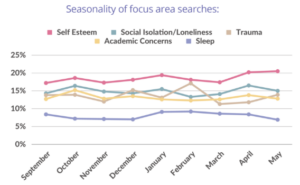Mental health concerns plaguing college campuses today create a variety of problems for the institution. Students struggling within themselves are less engaged in the classroom and face a higher likelihood of stopping out.
Thankfully, colleges have responded accordingly. Facing increased demand, mental health offerings have quickly become a pillar of student support, and students are becoming increasingly comfortable with seeking these services.
But what is it that’s ailing these students specifically? New data from Uwill, a teletherapy company, displays the most preeminent topics students want to discuss during counseling.
“There are many things that [higher ed leaders] are looking at to inform what decisions they’re making to improve the resources that students get access to and engage with,” says Erin Andrews, Uwill’s Director of Clinical Affairs. “Knowing the trends of what’s going on with students can help inform them on their initiatives, what to bring onto their campus and what resources to promote.”
Five focus areas make up 68% of students’ counseling inquiries. They are:
- Self-esteem: 18.5%
- Social isolation/loneliness: 14.8%
- Trauma: 13.4%
- Academic concerns: 13%
- Sleep: 8.3%
The data is informed by over 500,000 student searches between September 2022 and May 2023.
The driving forces behind students’ mental health problems
While this report creates a hierarchy of students’ primary areas of struggle, they aren’t all occurring in a vacuum from one another. They co-occur and impact each other and are usually symptoms of more significant issues.
One of them is students’ lack of community.
“Recently, sense of belonging has been a really big topic of conversation, which really goes hand in hand with the self-esteem and social isolation and loneliness piece,” she says.
Another larger issue students are confronting that may be leading to an avalanche of these problems is their social media consumption, a phenomenon the U.S. Surgeon General describes as “the defining public health issue of our time.”
Using the data to maximize support initiatives
But like all issues, they can be solved.
“What are the things that we can do to help students feel that sense of belonging to hopefully, in turn, have their self-esteem be boosted to feel less lonely, to feel more engaged on campus?”
The importance of timing
The data shows the different months that different focus areas spike, which can help leaders plan when to push various student support initiatives.
For example, social isolation spiked in October, January and April. Higher ed leaders could deduce that students are the most vulnerable toward the beginning of fall and spring semesters and the end of Spring semester, when students disperse for the long summer months.

But despite the spikes, the need is year-round, which goes to show the supply of mental health support services must be a well-oiled machine.
“It does show that there’s consistently students seeking mental health support all year long,” says Andrews. “So it’s really critical for school leaders to ensure that students have the wellness resources they need and deserve.”







